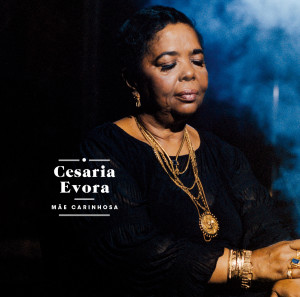 Cesaria Évora died in 2011 at the age of 70, having spent most of her life singing. This posthumous release gathers a baker’s dozen tracks she recorded over her career but which never ended up on any of her 11 studio albums. It serves as a perfect summation of that career and her seemingly effortless ability to illuminate these soft and bittersweet songs in Portuguese.
Cesaria Évora died in 2011 at the age of 70, having spent most of her life singing. This posthumous release gathers a baker’s dozen tracks she recorded over her career but which never ended up on any of her 11 studio albums. It serves as a perfect summation of that career and her seemingly effortless ability to illuminate these soft and bittersweet songs in Portuguese.
Évora grew up mostly in an orphanage in Mindelo, a city on the Portuguese-speaking island of Cape Verde off the Atlantic coast of Africa. As a teenager she started singing in clubs in Mindelo, then later went to Portugal, where she sang her sad songs to sailors in seaside bars. That’s where she was found by her longtime producer Jose da Silva, who took her to Paris to record her first album in 1988. Her 1995 release Cesaria took her fame to international heights, and she continued to sing until a few months before her death.
The songs here mostly alternate between the slow, sad-sounding morna style and a couple of more up-tempo styles, chiefly the bouncy, cumbia-like coladera. They also vary in setting, from almost purely acoustic to lush with strings, an occasional percussion loop and backing vocalists. So there’s a little bit of something here for her fans who might prefer one style over the others.
The best mostly come in the first half of the program, including two lovely and lively coladeras, “Tchon de Franca” and the title track “Mae Carinhosa.” Both have a sexy rhythm driven by lots of percussion from drums and various shakers, with a mixed chorus repeating a simple refrain. The latter has some really nice, almost Cuban-style piano during an instrumental bridge.
That piano shows up again on one of the best of the melancholy, romantic mornas, “Dor di Sodade,” which has a fairly simple arrangement. Not so the opening track “Sentimento,” which is lush and jazzy with layers of acoustic guitars and other strummed instruments, a piano setting the harmonic structure and a tenor saxophone and violin adding color and intrigue. Although most of these tracks include a subtly played electric bass guitar, there’s what sounds like a bowed acoustic bass on the stately “Caboverdean d’Angola.” The next song, “Enigue Ingrote,” is very sprightly, with bongos and other percussion and a start-stop rhythm from the electic bass. Multi-talented African jazzman Manu DiBango adds some colorful marimba to the highly orchestrated morna “Esperanca,” which is followed by the very fast and short song “Cme Catchorr.”
This posthumous album comes across as a fitting and dignified career overview of “The Barefoot Diva.”
(Lusafrica, 2013)
